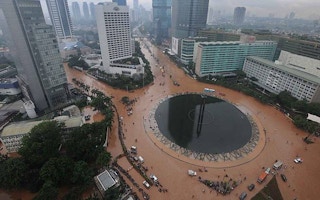The Rockefeller Foundation announced on Monday in Bangkok the start of the application process for its global 100 Resilient Cities Centennial Challenge.
To continue reading, subscribe to Eco‑Business.
There's something for everyone. We offer a range of subscription plans.
- Access our stories and receive our Insights Weekly newsletter with the free EB Member plan.
- Unlock unlimited access to our content and archive with EB Circle.
- Publish your content with EB Premium.
Initially launched in May, the non-profit project combines urban planning and climate change mitigation. One hundred cities will be selected in the course of three years to become part of the 100 Resilient Cities Network, which will be similar to a support group sharing and gaining access on best practices, strategies, technical expertise and resources on transforming into resilient urban hubs.
According to Rockefeller Foundation president Judith Rodin, “with 75 per cent of people expected to live in cities by 2050, it is more important than ever that these urban centres are able to withstand shocks and stresses – natural, climate-driven and man-made – and bounce back more quickly.”
Currently, 50 per cent of the world’s population live in cities, and the cost of urban natural disasters in 2011 alone was over $380 billion, said the foundation.
Rockefeller, which marked its centennial this year, is increasing its efforts to counter these shocks through its allotment of a $100 million fund for disaster preparation in cities, to be disbursed mainly through the challenge.
For this project, the foundation defines a city by a population with more than 50,000 residents with a local government or elected or designated chief executive office specifically assigned to lead the said population.
Municipal government leaders and major institutions affiliated with the city can file an application for their metropolis. This should include a letter of support from a senior-most representative of their local government, whether elected or appointed.
A city is limited to only one entry for the challenge.
Rockefeller explained that cities will be judged on various criteria such as how well they plan to address the specific needs of poor and vulnerable communities within their urban areas.
Those who successfully meet the requirements will receive membership in the 100 Resilient Cities Network, support and funds to hire a chief resilience officer (CRO) for the city who will develop resiliency strategies, and additional support to develop a resilience plan with proper tools and resources for immediate action.
Ashvin Dayal, Rockefeller Foundation managing director for Asia, said: “Through this challenge, the Rockefeller Foundation will make it possible for cities to develop resilience plans that respond to each city’s individual geographies, demographics and needs, as well as provide the resources to hire a chief resilience officer responsible for coordinating the different stakeholders and ensuring resilience remains a priority.”
“Building resilience is neither a top-down nor a ground-up process – it requires collaboration and leadership at all levels of governments and across every sector,” he added.
The deadline for registering for the 100 Resilient Cities Centennial Challenge is September 23.
To learn more about this project and to fill out an application, visit www.100resilientcities.org.










